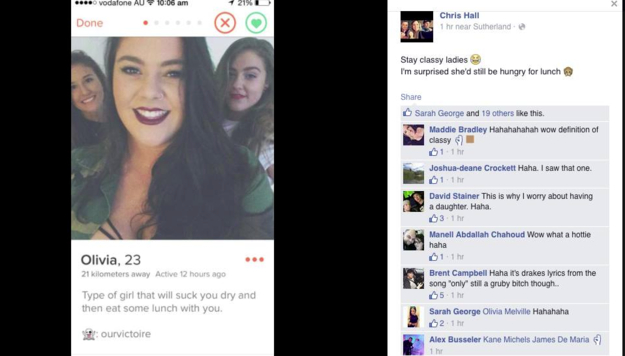Last October, an Australian man got taken to court for a series of harassing Facebook comments; the posts concerned a woman that he did not know and were written in mockery of a screenshot of her Tinder dating profile. The Facebook posts, which according to New Matilda‘s report were left by a 25-year-old man named Zane Alchin, appeared on Facebook in August of 2015 and attacked the woman in the original photo, as well as her friends, some of whom had appeared in the comments to defend her.
Alchin had initially entered a “not guilty” plea for the numerous communications, but as of today, that plea has been reversed to a “guilty” plea. Alchin will face sentencing on July 29th. The punishment for the law in question, which is section 474.17 of Australia’s Commonwealth Criminal Code Act, could be up to three years in prison. The police factsheet states that Alchin found the post about the Tinder profile from an “anti-feminist website,” then elaborates: “He was internet trolling and was unaware it was a crime.”
Indeed, Alchin’s original posts indicate his own lack of understanding about the law he had broken. When one of the women wrote that she intended to take his posts to the police, he wrote, “What law am I breaking? I’m not the one out of the fucking kitchen.” Given the extent of the graphic violence and sexual harassment in Alchin’s original posts, which can be found on New Matilda, it seems surprising that he did not think any consequence would arise.
In the past, Alchin might have been right to assume that. Many, many instances of online harassment have gone unpunished and ignored in the past. Paloma Brierley Newton, one of the women who received Alchin’s harassing messages, said in a statement: “Out victory today sends a message to all women that they don’t have to put up with harassment online; that there are steps and channels they can take, and that Australian law is on their side. This case will be the first of its kind and will represent a landmark victory for opponents of online harassment.”
As Newton’s statement explains, this case represents a very rare instance of the authorities responding to threats made over the internet, and it will send an important message to Australians. Similar cases have already unfolded in Canada and the UK, but in the United States, it remains very difficult to get a conviction for death threats sent over the internet. Hopefully, cases like these will encourage more internet users not to participate in online harassment to blow off steam, no matter where an “anti-feminist website” might encourage them to go.
(via NY Mag, image via Buzzfeed)
—The Mary Sue has a strict comment policy that forbids, but is not limited to, personal insults toward anyone, hate speech, and trolling.—
Follow The Mary Sue on Twitter, Facebook, Tumblr, Pinterest, & Google+.









Published: Jun 20, 2016 01:03 pm